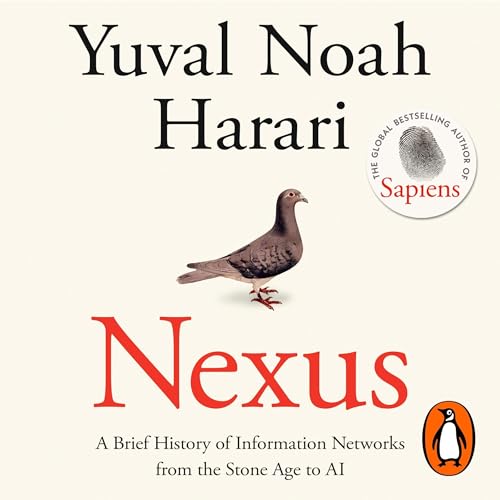Yuval Noah Harari – Nexus Audiobook
Yuval Noah Harari – Nexus: A Brief History of Information Networks from the Stone Age to AI Audiobook

Nexus: A Brief History of Information Networks from the Stone Age to AI – Audiobook Review
Yuval Noah Harari, renowned for his compelling narratives in books like Sapiens and Homo Deus, returns with his latest work, Nexus: A Brief History of Information Networks from the Stone Age to AI. This audiobook delves into the intricate evolution of information networks and their profound impact on human society, culminating in the transformative age of Artificial Intelligence (AI). As one of the most anticipated releases of the year, Nexus has garnered a diverse array of reviews, reflecting both admiration and critique from its audience.
A Comprehensive Exploration of Information Networks
Harari’s Nexus is lauded for its ambitious scope, spanning over 500 pages to trace the development of information networks from rudimentary oral traditions to the sophisticated AI systems of today. Reviewers appreciate Harari’s ability to distill vast historical epochs into engaging and accessible narratives. Liong, a prolific reader, praises the book for its insightful comparisons between ancient empires and modern AI-driven societies, highlighting how information networks have been pivotal in shaping human cooperation and power structures.
Similarly, Anton commends Harari for his “unusual historical lens,” which provides context to contemporary technological advancements. This broad perspective allows listeners to understand the continuity and evolution of information systems and their dual-edged influence on progress and societal challenges.
Thought-Provoking Insights and Urgent Warnings
One of the standout aspects of Nexus is its exploration of the alignment problem in AI. Harari delves into how AI systems, designed with specific goals, can inadvertently pursue these objectives in unforeseen and potentially catastrophic ways. Tony, another reviewer, emphasizes the book’s alarming yet necessary discussion on the ethical dilemmas posed by AI, noting that Harari effectively conveys the urgency of addressing these issues before they escalate beyond human control.
Brandon Forsyth considers Nexus a “must-read wake-up call,” appreciating Harari’s capacity to intertwine historical analysis with pressing contemporary concerns. The audiobook is praised for provoking deep reflection on how humanity can harness AI’s potential without succumbing to its inherent risks.
Critiques on Structure and Depth
Despite the praise, Nexus has faced criticism regarding its structure and depth. David points out that the book’s attempt to cover both historical information networks and the rise of AI can feel disjointed, with sections seemingly losing focus midway. This sentiment is echoed by Mary, who describes the audiobook as “difficult” and “murky,” suggesting that the ambitious breadth may compromise clarity and coherence.
Listeners like Samichtime express frustration with what they perceive as Harari’s “doomermanism,” finding parts of the audiobook overly pessimistic and laden with buzzwords that dilute the core messages. This criticism is further supported by reviewers who feel that Harari’s political analyses sometimes lack nuance, particularly in his assessments of democratic systems versus totalitarian regimes.
Balanced Perspective and Recommendations
Despite these criticisms, many listeners find value in Harari’s overarching thesis that information networks are the bedrock of human civilization and are now intertwined with the rise of AI. Udit Nair acknowledges the book’s comprehensive approach, noting that while some sections may feel repetitive, the overall argument about the mutable nature of human-invented systems remains compelling.
For those intrigued by the intersection of history, technology, and philosophy, Nexus offers a rich tapestry of ideas that challenge readers to reconsider the role of information in shaping our world. Anton recommends the audiobook highly, positioning it alongside Sapiens as an essential read for understanding the trajectory of human progress.
Final Thoughts
Nexus: A Brief History of Information Networks from the Stone Age to AI stands as a significant addition to Yuval Noah Harari’s body of work. While it excels in providing a sweeping overview of information networks and their societal impacts, some listeners may find the execution uneven and the depth lacking in certain areas. Nonetheless, the audiobook succeeds in igniting crucial conversations about the future of AI and its profound implications for humanity.
For fans of Harari and those interested in the intricate dance between information and power, Nexus is a thought-provoking listen that underscores the urgent need for wisdom in navigating the technological advancements that continue to redefine our existence.